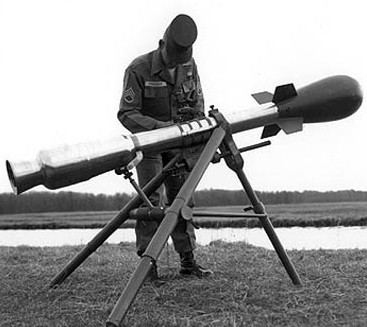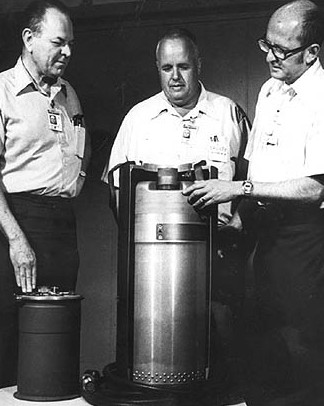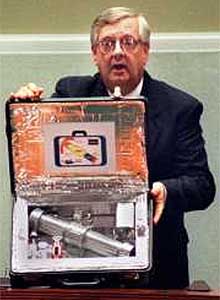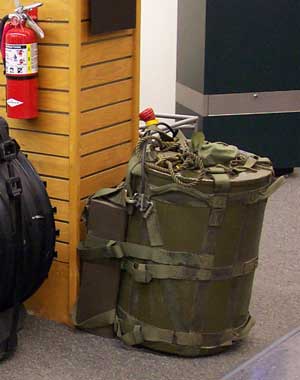|
Suitcase Nukes What could be more scary than the idea of terrorists traipsing around the United States with suitcase-sized nuclear weapons, ready to dispense death on a massive scale in the first-ever atomic attack on American soil? Wow. That sure is scary.
What could be more scary than the idea of terrorists traipsing around the United States with suitcase-sized nuclear weapons, ready to dispense death on a massive scale in the first-ever atomic attack on American soil? Wow. That sure is scary. Suitcase nukes are perhaps the apex of paranoid fear lurking on the far edge of the possible. In a 2001 interview with Pakistani journalist Hamid Mir, al Qaeda No. 2 Ayman Al-Zawahiri boasted that the terrorist network had its suitcase nukes locked and loaded. According to Mir, Zawahiri said:
"If you have $30 million, go to the black market in central Asia, contact any disgruntled Soviet scientist and a lot of ... dozens of smart briefcase bombs are available. They have contacted us, we sent our people to Moscow, to Tashkent, to other Central Asian states, and they negotiated, and we purchased some suitcase bombs."Since then, as you may have noticed, dozens of fertilizer-fueled truck bombs have exploded, but mysteriously, no nuclear weapons have been sighted. It is physically possible to make a nuke that is more or less the size of a suitcase, and it's theoretically possible they could be bought and sold on the black market. Fortunately, it's not as easy as running over to the Uzbekistan Wal-Mart and handing them your credit card.
During the 1960s, the U.S. Navy developed a weapon called a Special Atomic Demolition Munition (SADM) which was approximately the size of a large backpack and designed to be delivered by a team of two paratroopers, who would drop the device, arm it and then swim away to be picked up by a submarine or ship. The blast would theoretically have as much as a kiloton of explosive power. Even presuming the target was near water, this was a cumbersome system, which may have to do with why the program was scrapped. Even though it was only briefly considered a reasonable way to deliver nuclear weapons, about 300 SADMs were built, only to gather dust in an arsenal somewhere. All these efforts were 40 years ago, however. Technology has come a long way since then. The type of suitcase nuke people talk about today is estimated to be about the size of a small radiator or a George Foreman Grill. It requires about 25 pounds of the highest grade plutonium to work, plus some sort of undefined firing mechanism which would likely weigh more than the actual nuclear fuel.
The story behind the suitcase nuke scare originated with Lt. Gen. Alexander Ivanovich Lebed, a retired Soviet national security official, who in 1997 warned that the collapsed former Soviet Union could not account for 80 to 100 suitcase nuclear weapons with a one-kiloton payload, designed to be operated covertly by a single person. A former science adviser to (Broken link for Boris Yeltsin) has also made public claims about Soviet programs to build suitcase or backpack sized nuclear weapons. Alexei Yablokov told PBS Frontline: Yes, small atomic charges exist. They are very small. Several dozen kilos, thirty kilos, forty kilos [60 to 90 pounds]. I spoke with people that made them, I saw them. The American specimens can be seen on the Internet, they can be seen on photographs, they can even be seen in the movies. I have never seen Russian analogies, I have only seen American ones, but Russian ones do exist, because I spoke with people who made them, and I believe these people, these people knew what they were talking about. ... No one knows how many exist.These are apparently the bombs Zawahiri was referring to. It's well-documented that al Qaeda has been trying to get a nuclear weapon of some sort for a long time, so the claim isn't absurd on the face of it. Starting no later than the early 1990s, al Qaeda operatives began trying to find uranium and other components for a nuclear weapon. The major argument against such a development is that no one has seen or heard of anything like these bombs in the terror network's arsenal. Despite the U.S. invasion of Afghanistan, nothing even remotely nuclear was ever deployed against military or civilian targets in that country. Nor have any weapons been recovered, at least as far as anyone in any country is willing to admit in public.
For what it's worth, the experts don't think the suitcase nuke is much of a threat. Most of the people who spend their lives worrying about Russia's nuclear stockpile say that the suitcase nukes have "mostly" been accounted for. So that makes you "mostly safe." Of course, in scientific terms, that means no one can give you an accurate estimate of just how safe you are. There is no percentage associated with "mostly." It's not rocket science. Well, not exactly. In the unlikely event of a nuclear terrorist attack, the Department of Homeland Security has some helpful advice -- the same advice it has for a dirty bomb attack, a biological weapons attack, a chemical weapons attack or a bomb attack:
|
 One of the smallest nuclear warheads ever "officially" made was called the W54. Like so many insanely dangerous items in this world of ours, it was invented by the United States government. Tested in the late 1950s, the W54 was designed to be deployed on a bazooka-sized firing mechanism and deliver a tiny 0.01 kiloton blast, which is about enough explosive power to devastate a city block or two.
One of the smallest nuclear warheads ever "officially" made was called the W54. Like so many insanely dangerous items in this world of ours, it was invented by the United States government. Tested in the late 1950s, the W54 was designed to be deployed on a bazooka-sized firing mechanism and deliver a tiny 0.01 kiloton blast, which is about enough explosive power to devastate a city block or two.  The maximum yield currently imaginable from a suitcase nuke is about five kilotons, or not quite half the explosive power of the bomb dropped on
The maximum yield currently imaginable from a suitcase nuke is about five kilotons, or not quite half the explosive power of the bomb dropped on  Given the current administration's predilection for
Given the current administration's predilection for